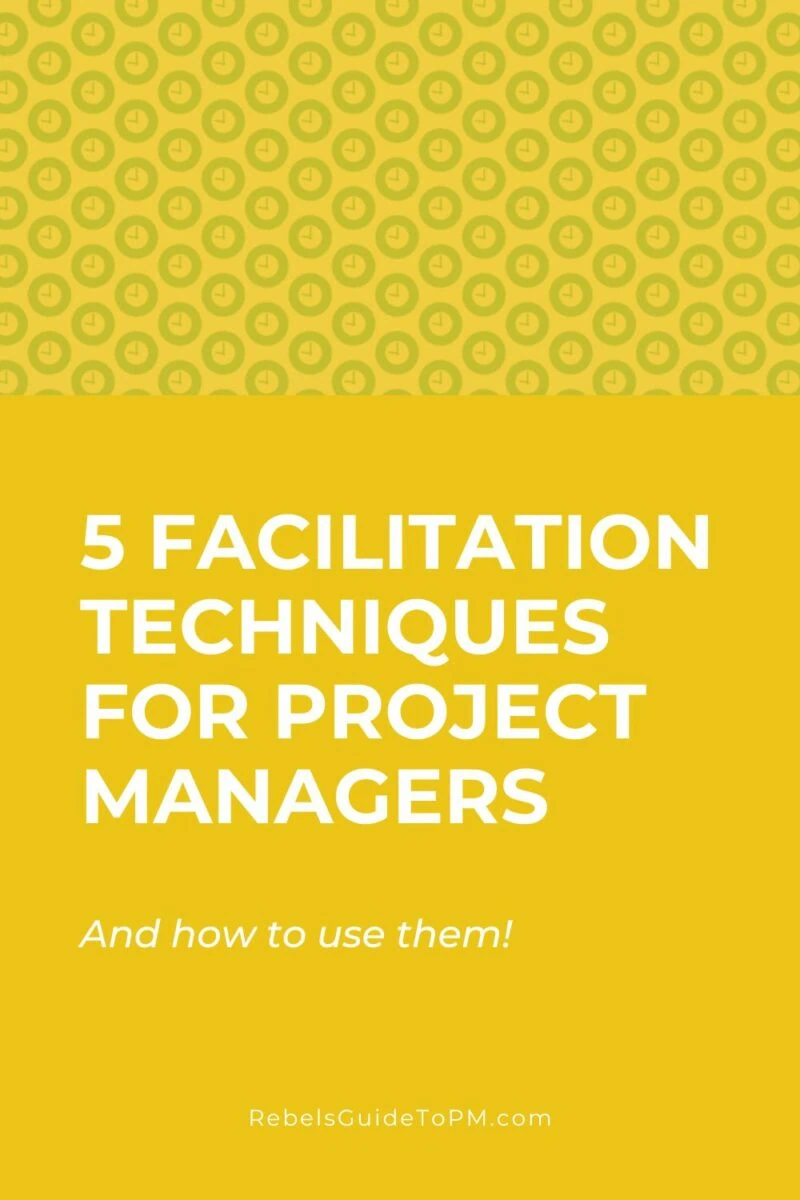5 Facilitation techniques for project managers and how to use them
Facilitation is one of the things I enjoy most about my work. It’s a fun way of engaging with a group and helping them achieve something that they wouldn’t be able to do as individuals. You can draw out the experience and expertise in the room and create a sense of ‘team’ as well.
Facilitation is also a key skill for project managers, especially when you are working with your project team and stakeholders from various locations. You are often the common thread that keeps a group of individuals hanging together until a ‘real’ project team is formed.
Facilitation is one way to do that, and in this article I’ll look at 5 different kinds of project management facilitation techniques you can use during the project.
But first, let’s clarify what we mean by facilitation.
Facilitation defined
Facilitation is simply the process of managing the discussions and interactions during a meeting or event. It’s about keeping the conversation on track and helping the group reach an outcome, whatever that might be.
Many teams use external facilitators (sometimes from the PMO) for particularly difficult conversations or where the outcome is unknown, but in a project environment the team is likely to look to you, the project manager, for this role.
As a facilitator on a project team, you’ll have to make sure that everyone contributes where they need to, to keep conversations on track, to value everyone’s time and to keep the team moving in the direction of the outcome.
Think of facilitation as a way to ensure that the team together is worth more than the sum of its individual parts.
Project managers can use facilitation techniques throughout a project. In this article I’ll focus on the functions of facilitation and scenarios that crop up during a project. Your facilitation skills are first put to the test in the project initiation phase so that’s where we’ll start.

1. Facilitation for building a team
You probably facilitate discussions without realising what you are doing, and when it comes to putting a new team together, that’s no exception.
When you are building a team you’re using the facilitation skills of observation, questioning and active listening to understand what each person brings to the table. You can help others do the same in a group environment by encouraging everyone to share their past experiences and bring their knowledge to the table.
One of the best ways to do this is to define roles and responsibilities. You’ll normally do this in a table or other project document, but what if you did it as a group discussion?
A group discussion is a good way for everyone to get to know each other and you’ll leave the meeting with a common understanding of where people’s skills lie and how they will contribute to the project as it moves forward.
Techniques: Observation, questioning, active listening
When to use: When meeting new people, talking to stakeholders
2. Facilitating for identifying tasks
During the early stages of a project you’ll be working on identifying project tasks, for your project plan, schedule and your Work Breakdown Structure. You can use your facilitation skills to help the team do this together.
Brainstorming is probably the most common form of group technique for this kind of thing, and as a facilitator, you can set the session up to get the most out of it.
In fact, I’d say that most of the success of facilitation happens in the planning. Take the time to prepare your facilitation process for the meeting and think about what the team needs to achieve when they leave the room. Then, structure the session around achieving those outcomes.
For example, in a brainstorming session where you want to identify project tasks, prepare flip chart sheets with major headings on.
Have enough sticky notes or pens for everyone. Effective facilitators don’t rely on hoping that the location has some – we carry extras in our bags!
Prepare your instructions so that you can give them clearly. In the meeting itself, make sure that everyone has the opportunity to contribute their ideas and allow challenges in a constructive way.
Done well, you should leave with a good understanding of the tasks that are required on the project and a sense of achievement for having worked together to understand what’s needed.
Techniques: Decomposing tasks, managing meetings, resolving conflict or differences
When to use: For idea generation
3. Facilitating for generating solutions
Another area where you are likely to need your facilitation skills in the early part of a project is in generating solutions. You know what your project is going to have to achieve, but you might not know exactly how you are going to get there.
A facilitated session to generate solutions to achieve a common goal, solve a problem or simply to come up with lots of ideas can springboard you into the project.
Facilitators prepare in advance, even if you don’t know what the outcome might be. Make sure that you set the expectations for the discussion and some ground rules, such as not talking over each other, turning off mobile devices, and respecting the views of colleagues. Don’t assume that this is going to happen unless you ask for it!
Everyone could have something useful to contribute to the solution to a sticky problem or an idea for launching the project off to a great start, so don’t let anyone dominate your conversation.
Someone might end up dominating the conversation without anyone being particularly conscious of it, especially if you have a mix of management levels in the room – in my experience, the people higher up the hierarchy tend to speak more in these settings partly because the people on the lower rungs defer to their experience and position.
Watch for that happening and encourage everyone to participate.
The solutions you generate to the problems you face in project initiation will not only help you move the project on, but will also set the tone for how you tackle difficult problems later in the project: as a team.
Techniques: Brainstorming, time keeping, probing questions, allowing everyone to contribute, ranking criteria, group decision making tools
When to use: For idea generation
4. Facilitating for staying on time
A bad meeting for me is one where we overrun, don’t stick to the agenda and don’t finish the meeting having achieved the goal (or sometimes, anything useful at all).
Given the amount of project meetings we have, a strong facilitator (that’s you) can really make a difference.
While you need to spend an adequate amount of time on project planning, there is a risk that your planning drifts on and on and you never really get started. One of the core skills of facilitation is time management and that’s something that project managers need to be really good at!
Think about time on a macro scale – beyond making sure that the meeting finishes at 12 noon.
Prepare your first few weeks on the project and use a facilitative approach to guide the team through this time so that you achieve what’s required within a realistic period.
Many teams will need someone to put the pressure on and to make sure that they are sticking to the deadlines that they agreed – that’s the perfect overlap of facilitation and project management!
Techniques: Time management, keeping momentum, unblocking problems, creating an agenda, meetings management, project management meeting facilitation
When to use: During meetings and planning sessions, during regular team calls

5. Facilitation for connecting others
Part of your role as a project manager is to be the glue that holds the team together – if you’ve come to one of my presentations, you might have heard me talk about being the glue before.
You can facilitate connections between individuals on the team and other stakeholders so that work gets done more easily and with less friction.
I find that in the role I do, kind of a central position, I see the organization in a way that subject matter experts in their individual departments don’t. I also get to work with lots of different teams and people.
Recently, I got asked about something and even though I didn’t know the answer, I knew who would know – and the person asking had been in the organization longer than me, and they didn’t know.
I feel project management is a very privileged position because it exposes us to different areas of the business.
Connect your colleagues, point them in the direction of people who could help, or contribute, or have something to say.
Techniques: Encouragement, networking, planning, creative and strategic thinking
When to use: Throughout the project
What next?
Facilitation is one of the core project management skills, used on all types of projects, by all successful project managers.
The good news is that if you don’t think your skills are up to scratch, there are lots of good quality facilitation training courses you can do for professional development – this really is a skill that can be learned.
If the list above chimed with you, what else would you add? Connect with me on LinkedIn and let me know!
